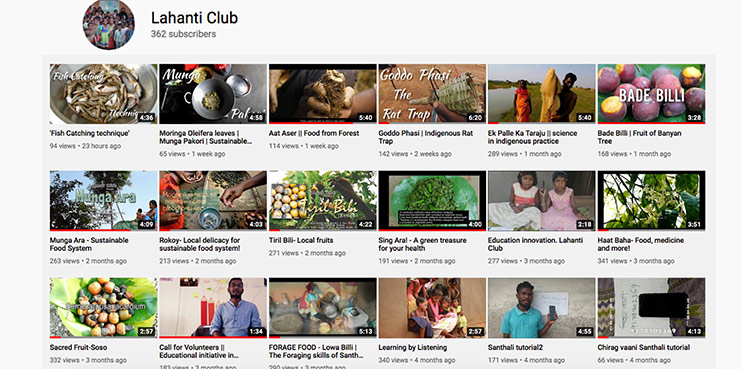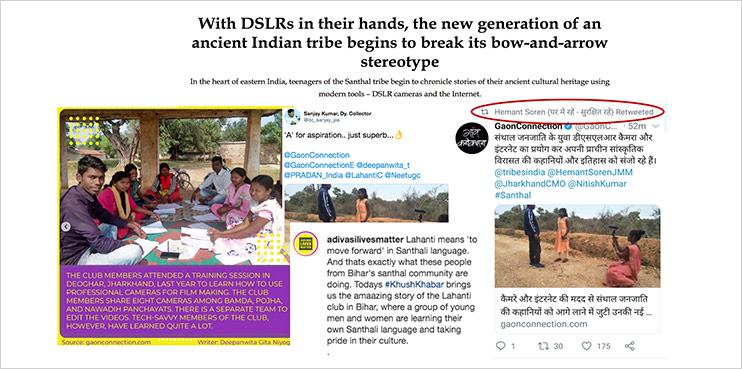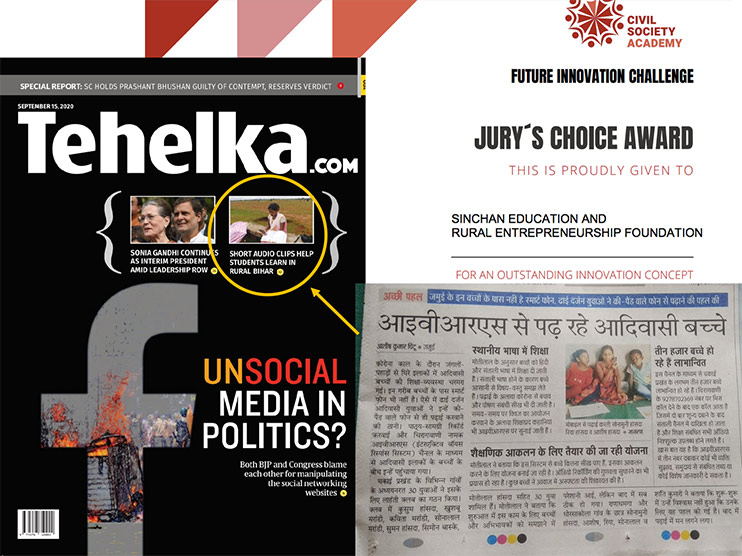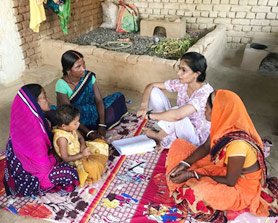 |
|
|
View in Browser
|
|
|
Glimpses from Research
SEPTEMBER 2020 |
|
This is the fourth edition of Research Newsletter published by Research Wing, an integral part of the Research and Advocacy function (CF5) of PRADAN. As you all know with these newsletters we are sharing some of those interesting moments with all of you so that you get to know the work better and be a part of the journey. We believe the sharing of our work will not only draw interest amongst fellow colleagues but will initiate wider possibilities of knowledge exchange, collaboration and practice. You can read more on the different research projects in ‘research’ on sampark.net
platform. You may want to share your thoughts or feelings
seeing some of these glimpses, with us. Please feel free to
do so at research@pradan.net
You can check the First edition of Research Newsletter here , second edition here and third edition here .
|
|
|
|
Building a collaborative space |
|
The Research Wing aims to create a collaborative space for researchers from various educational institutions and organisations, policy makers and practitioners from diverse backgrounds and disciplines to work together on research in a variety of areas. As we pursue collaborative research with educational institutions, four areas of engagement become important and open up:
(a) students from these institutions wanting 'experience' and keen to take on small assignments that are aligned with PRADAN's interests, too;
(b) Masters level students looking to do their 'project' or 'thesis' with us, on an area that is mutually meaningful;
(c) Doctoral students embedded in our research agenda-those supervised by our research collaborators or our own colleagues doing their PhDs overseas;
(d) Post-doctoral candidates working on specific research themes and agenda.
These offer ways to strengthen our research agenda and to build the linkages and networks into the future. It is, in that sense, a form of 'convening', which until now we have defined as meetings, symposia, rountables, kick-off and dissemination events etc.
In the past couple of months, we received four interns from TISS and NIT working with us on various short-term assignments in different research projects to gain experience. They were involved in research activities starting from data management and learning to conduct initial analysis using excel, analysis of data and writing a report, to engaging in secondary data collection and doing a preliminary stage of literature review. Not only did that potentially add some skills to their basket of learning, but also provided us with an alternative pair of insights while adding swiftness to the progress in our projects.
|
|
|
|
|
|
Participatory film-making to document indigenous knowledge |
 |
|
| “If we do not make such videos, one day our children will forget our rich food tradition”
Supported By the Global Research Translation Award, CHIRAG project is providing a platform for the youth in Chakai to share and document their intergenerational knowledge on food and nutritional practices. In the last three months, these youths, called the CHIRAG mentors with support from CHIRAG team members have made more than 10 short films on various forest foods, their collection, foraging and cooking methods and how it is preserved within the community. You can watch these short films and share your feedback on Lahanti Club’s youtube Channel
The CHIRAG mentors and the team participated in a workshop held in Deoghar facilitated by Dr. Christine Cornea from the Film, Televisions and Media Studies of the University of East Anglia (UEA). The two-day residential Film and Photography workshop developed their understanding on the importance of documentation and built their capacity on using various methods and tools for documentation process through short films. One of the short films on the Lahanti club you tube channel, ‘Aat Aser’ is made by Dr. Christine and her team at UEA, UK.
|
|
|
|
SANTHALI YOUTH MAKING THEMSELVES INTO NEWS |
 |
|
|
Gaon Connection, India’s biggest rural media platform published an article on the Santhali youth in Chakai chronicling their cultural heritage around food practices, titled: “With DSLRs in their hands, the new generation of an ancient Indian tribe begins to break its bow-and-arrow stereotype”. It was a matter of huge joy for the youth and our whole team when the article was retweeted by the chief Minister (of Jharkhand) himself and another government official in Jharkhand. The story was also shared by another web-portal called ‘Adivasi Lives Matter’ , an online content creating platform with a mission to bring out adivasi awaaz. A local journalist in Jamui learnt about the article and the work done under CHRAG and covered a full story in Dainik Jagran on how children in Chakai villages are using CHIRAGVaani to study; the Interactive Voice Response System (IVRS) platform that is being developed in collaboration with GramVaani as a part of CHIRAG.
Read the article here (English) and here (Hindi)
|
|
|
|
Recognition and awards FOR SINCHAN FOUNDATION |
 |
|
|
Sinchan Education and Rural Entrepreneurship Foundation is a community-based organization registered under the Section 8 of Company Act. The journey of Sinchan started with an action research in PRADAN, Chakai undertaken by Shuvajit Chakraborty in 2015. Gautam Bisht (co-founder of Sinchan), then a student of Ambedkar University, Delhi became a part of this action research and worked on designing indigenous pedagogy for Santhali children in Chakai. Shuvajit, also a co-founder of the Sinchan and Gautam’s field supervisor for this action research, has been working with the Santhal population for livelihood promotion since 2011 with PRADAN. Building on this, in 2019, Sinchan Foundation was formed to bring academia to collaborate with practice. The foundation is working closely with the community towards the goal of establishing contextual learning frameworks to supplement the learning opportunities available to Santhali children and building rural entrepreneurial ecosystems. Our mission is to create contextual and sustainable enterprises, so that tribal youth of our area will not be migrating but working as contextual entrepreneurs and who will be utilizing their local resources for various income opportunities.
Currently, Sinchan is working in Chakai block of South Bihar. Within the community Sinchan has identified motivated young people to create an inclusive learning environment for children of primary education. This young group, called ‘Lahanti’ (a Santhali word for progress has created learning centers in the villages that have no schools and operate within government schools)
Civil Society Academy-future innovation challenge is a mentor-ship programme looking for creative visionaries and social innovators with a passion for social justice. In light of Covid-19 and the challenges faced by civil society globally, the focus of Future innovation challenge 2020 was-How civil society may change in the 2020s and how might we embrace emerging opportunities for a better world? Sinchan Foundation participated in this three-day challenge and presented the idea of localizing the market system through contextual tribal products. This is the pitch that bagged them the Jury’s Choice Award.
The initiative was published by Dainik Jagran in Jamui and very recently by Tehelka. Read the article published on Tehelka here |
|
|
|
Re-fashioning of the GROW project amidst COVID-19 |
|
 The GROW-Gender Responsive Organisations for Women project has been in the midst of review and re-alignment given the impact of Covid-19 and the returning migrant crisis on the project goals. The time between May and July has been mostly focused on working with the women's collectives and all other stakeholders to develop plans that cater to the immediate needs of the women and the community as a whole which has mainly emerged as livelihood options. As a result, the research that was based on process documentation as a methodology, has also for the time being slowed down while we wait for more clarity to emerge w.r.t to longer term project plans.Meanwhile, we have been working on analysing the data from Phase One of the project - the gender learning camps conducted with different sets of people both at the State and community levels. The pre and post training data has been statistically analysed and we're in the process of developing the implications of these. We are also in the process of creating a respondent sample from different categories of training participants for data collection for stories of change post these trainings using the critical incident technique. The GROW-Gender Responsive Organisations for Women project has been in the midst of review and re-alignment given the impact of Covid-19 and the returning migrant crisis on the project goals. The time between May and July has been mostly focused on working with the women's collectives and all other stakeholders to develop plans that cater to the immediate needs of the women and the community as a whole which has mainly emerged as livelihood options. As a result, the research that was based on process documentation as a methodology, has also for the time being slowed down while we wait for more clarity to emerge w.r.t to longer term project plans.Meanwhile, we have been working on analysing the data from Phase One of the project - the gender learning camps conducted with different sets of people both at the State and community levels. The pre and post training data has been statistically analysed and we're in the process of developing the implications of these. We are also in the process of creating a respondent sample from different categories of training participants for data collection for stories of change post these trainings using the critical incident technique.
|
|
|
|
Monitoring transitions and variations in agro-ecological zones |
|
Regenerative agriculture is an exciting new step towards sustainability in agriculture. It is defined as a system of principles and practices that builds soil, improves hydrology, enhances agricultural produce, and promotes biodiversity at the farm scale. At the core of regenerative agriculture lies the moral question of
‘how we can give back to the environment’. This drives the need to look at all components of the ecosystem as inter-twined sections that influence each other significantly. The influence transcends biophysical effects and becomes an important stimulus for change in farming practices, markets, NGO’s and the society. Since these interventions set off a plethora of shifts in its ecosystems, monitoring the transformations these agro ecological zones becomes crucial. PRADAN has been grappling with this conundrum and experimenting with various regenerative agriculture interventions in Jharkhand.
Agricultural regional mapping and monitoring of agro-ecological zones have been imperative in recognizing, identifying and evaluating productivity of crops as part of the regional ecosystems. By creating synergetic natural ecosystems, agroecology unlocks positive interactions, thereby reducing the need for harmful and expensive chemicals. As the need for a sustainable food system becomes more critical, agroecology is intensifying the global agenda through international institutions and in farming practice. Developing technological basis for obtaining remote sensing data and ground-based observations of high-level accuracy and reliability with its subsequent introduction into the monitoring system of agricultural lands has gained importance, especially in the post COVID world.
To operationalize sustainability of agroecology, we have been working on identifying the properties of agroecological systems and developing a system to evaluate agroecological transitions.
An Ex-ante component designs and develops a database of initial states and capacities which includes an inventory of the landuse, landcover, geomorphology, soil, water resources and other natural resources. Geo-spatial technology reduces this laborious task by providing us archival and current images of great resolution and detail. The disturbances component tries to monitor the changes in land use and monitor the shocks or changes in the ecosystems as and when these agricultural interventions are introduced.
The third component
is an ex-post component with an inventory of subsequent states and trajectories. Social
factors, ecological factors and system functions together present the components of
agroecological variations.
|
|
|
Exploratory research on micro-production arrangements (MPAs) and farmer producer
organizations (FPOs):
Societal needs and socially responsible supply networks
|
|
|
Taking a social psychology perspective, we draw on the reflections of leaders and members (‘usergroups’ i.e., youths, females, the elderly etc) who discuss their expectations and experiences in the context of nascent, emerging and mature FPOs. We plan to observe stages of transition where FPOs were formed and coordinated, to explore how MPAs (through various FPO stages and scales) best establish ethical norms and organize for equity and inclusivity.
Two central questions we explore in this study are:
(a) How might MPAs best establish ethical norms as they collectivise and grow?
(b)How might MPAs best share created value fairly amongst its members (equity)?
A practical contribution envisaged is: How might socially responsible supply networks be best configured to deliver specific user profile objectives (inclusivity)?
This research is being conducted by PRADAN (in Chakai), MS Swaminathan Research Foundation and
a group in Almora in collaboration with the University of East Anglia, UK. It is supported under the aegis
of the TIGR2ESS research programme with Cambridge University.
Current status: Questionnaires have been tested and data collection is underway.
Shuvajit Chakraborty, Astha Upadhyay and Nivedita Narain are currently involved with this.
|
|
|
|
|
|
Copyright © 2020 PRADAN
. All Rights Reserved. |
|
|
